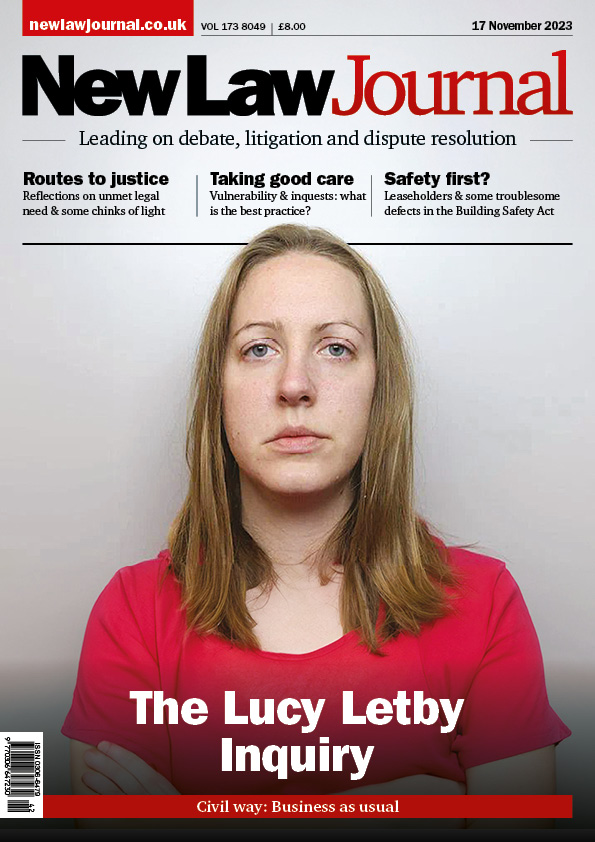THIS ISSUE

Business as usual; New liability for employers; Latest FPR PD update; Bankruptcy annulment; Mission for no commission
Sailesh Mehta & Tom Davies put the Lucy Letby Inquiry under the spotlight
Sir Geoffrey Bindman KC looks back to the feud of Bacon & Coke
Imran Khodabocus calls for honour-based abuse to be given a legal definition
Tim Suter & Sophie Cartwright KC look at the measures available to support vulnerable witnesses
Laura Rees suggests it’s time Parliament reviewed the Solicitors Act 1974 to give consumers & solicitors better protection
The government has missed an opportunity to establish a legal definition of honour-based abuse, Imran Khodabocus, director, the Family Law Company, writes in this week’s NLJ. A recommendation that this be done was made by the Women and Equalities Committee but rejected by the government in September
Nicola Brant finds troublesome defects in the Act which was meant to improve building safety after Grenfell
How is the EU law thread in Agnew to be applied to the rest of the UK? Charles Pigott reports
MOVERS & SHAKERS

Jackson Lees Group—Jannina Barker, Laura Beattie & Catherine McCrindle
Firm promotes senior associate and team leader as wills, trusts and probate team expands

Asserson—Michael Francos-Downs
Manchester real estate finance practice welcomes legal director

McCarthy Denning—Harvey Knight & Martin Sandler
Financial services and regulatory offering boosted by partner hires
NEWS
The cab-rank rule remains a bulwark of the rule of law, yet lawyers are increasingly judged by their clients’ causes. Writing in NLJ this week, Ian McDougall, president of the LexisNexis Rule of Law Foundation, warns that conflating representation with endorsement is a ‘clear and present danger’
The Supreme Court has drawn a firm line under branding creativity in regulated markets. In Dairy UK Ltd v Oatly AB, it ruled that Oatly’s ‘post-milk generation’ trade mark unlawfully deployed a protected dairy designation. In NLJ this week, Asima Rana of DWF explains that the court prioritised ‘regulatory clarity over creative branding choices’, holding that ‘designation’ extends beyond product names to marketing slogans
From cat fouling to Part 36 brinkmanship, the latest 'Civil way' round-up is a reminder that procedural skirmishes can have sharp teeth. NLJ columnist Stephen Gold ranges across recent decisions with his customary wit
Digital loot may feel like property, but civil law is not always convinced. In NLJ this week, Paul Schwartfeger of 36 Stone and Nadia Latti of CMS examine fraud involving platform-controlled digital assets, from ‘account takeover and asset stripping’ to ‘value laundering’
Lasting powers of attorney (LPAs) are not ‘set and forget’ documents. In this week's NLJ, Ann Stanyer of Wedlake Bell urges practitioners to review LPAs every five years and after major life changes







